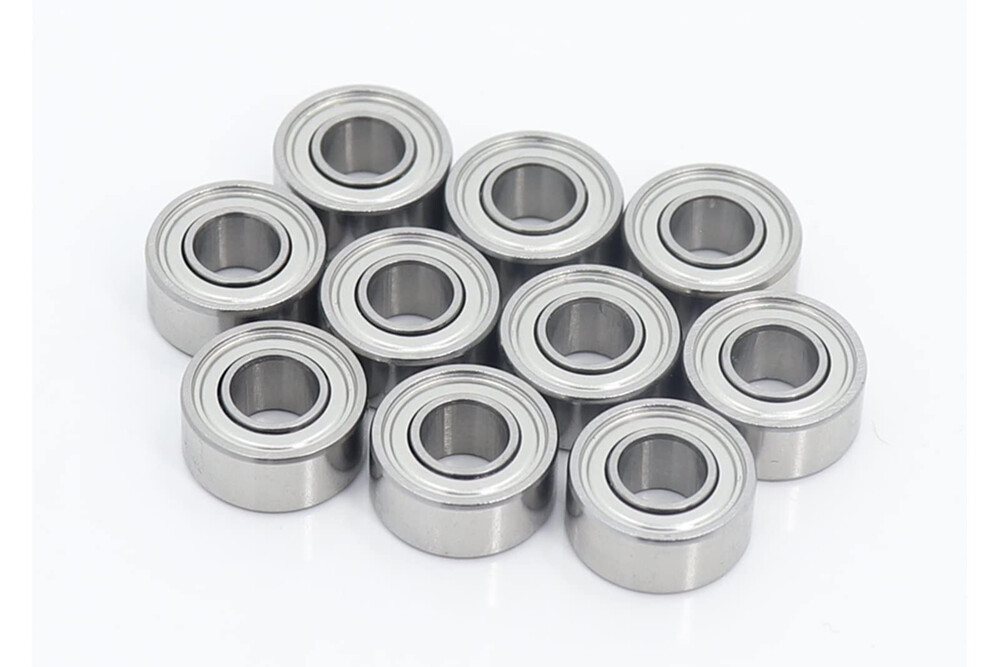
Bearing Manufacturer & Supplier
Specialize in ball bearings, roller bearings, thrust bearings, thin section bearings etc.
What you should know about EMQ bearings
Engineers are very demanding about how quiet the motor is (that is, the motor makes very little noise and vibration when running). Therefore, the industrial manufacturing industry coined the term “motor quality” to identify low-noise, low-vibration rolling bearings for special applications. Today, EMQ bearings are needed in various industries, such as fans, pumps, compressors and other types of electric equipment. In this blog post we will provide an overview of EMQ bearings, their structure and their applications.
Table of Contents
ToggleWhat is EMQ bearing?
EMQ bearings are designed to meet specific performance applications such as those used in silent electric motors. EMQ bearings are available in 3 different noise levels ZV2 (low noise), ZV3 (very low noise) and ZV4 (ultra low noise). They are typically made from high-quality materials such as chromium steel and held to tight tolerances. The cages used in EMQ bearings are also designed to minimize friction and reduce noise. They usually feature high speed and low noise, and can withstand high temperatures and loads. EMQ bearings are also designed to reduce the risk of arcing and generally have a longer service life than standard bearings, which can significantly reduce maintenance costs and downtime.

Sources of bearing noise
Noise in bearings is generated by vibration and is a function of rotational speed. The greater the vibration, the shorter the bearing life—plus, excessive vibration can damage the motor or machinery. Vibration is caused by a variety of factors, including raceway and ball surface roughness or damage, poor geometric tolerances (roundness, concentricity, runout, or parallelism), contamination, improper lubrication, incorrect radial clearance, and shaft and housing fit Don’t wait.
Particulate contaminants that get into bearings can increase noise levels – however, engineers can prevent contaminants from entering by using nitrile rubber seals or metal shields, and taking care to only use filtered lubricants. Proper radial clearance of the bearing is also crucial: it should be as close to zero as possible without causing the bearing to seize on the cage or balls during rotation. If the radial clearance is too loose, excessive noise vibration will result. Roundness of the shaft and housing can also contribute to noise, especially in smaller and thin-section bearings. Poor roundness will cause the bearing ring to deform during installation, thus affecting smooth rotation and causing noise.

How to reduce bearing noise?
EMQ bearings are manufactured by super-finishing the rolling contact surfaces to a mirror-like finish, resulting in very smooth rotation. It is also important to strictly control the geometric tolerances of bearing components.
EMQ2 (ZV3) bearings
EMQ bearings are rated EMQ2 (ZV3) and are suitable for extremely low noise or low vibration applications. Various radial clearance groups are available, but the most common are CN (standard) radial clearance and C3 (loose) radial clearance. Our motor bearings are typically manufactured from SAE52100 chromium steel and are individually tested before approval. These deep groove radial ball bearings can handle heavy radial loads and moderate thrust loads in both directions. Many other sizes of bearings are available that provide low noise, but these are the most commonly used.

EMQ Bearing Inspection
EMQ Bearing manufacturers typically perform 100% noise checks on bearings using a special device called an Andrew’s instrument (or similar instrument). The device measures the vibration speed (displacement x frequency) of a rotating bearing in André units (equivalent to 7.5 micrometers per second) and covers three frequency bands: low, medium and high. The higher the vibration speed, the louder the bearing noise.

EMQ Bearing Maintenance
You should monitor the lubrication of your bearings regularly to maximize the life of your bearings. EMQ bearings have very tight tolerances, so the bearings often do not slide completely into the housing. You may need to lightly sand the edge of the shaft seat to remove burrs and put a drop of oil on it to fully seat the bearing. Like any other type of bearing, the service life of EMQ bearings depends on external factors. Extreme care should be taken during handling and installation as the impact of a bearing being dropped or being struck during installation can produce small dents in the raceways, known as Brinell indentations. Brinell marks can produce excessive vibration during rotation, ultimately leading to bearing failure.
EMQ ceramic hybrid bearings
EMQ ceramic hybrid ball bearings use silicon nitride (Si3N4) ceramic balls and steel races. Ceramic balls weigh 40% less than steel balls, depending on their size. This reduces centrifugal loads and slip, so hybrid ceramic bearings run 50% faster than conventional bearings. This means that the outer race grooves exert less inward force on the ball as the bearing rotates. The reduction in force reduces friction and rolling resistance. The lighter balls allow the bearings to spin faster and use less energy to maintain their speed.

Application of EMQ bearings
EMQ bearings are commonly used in electric motors, which are used in a wide range of applications including HVAC systems, pumps, compressors and fans. They are also used in other types of electrical equipment, such as power tools and appliances. Due to their high performance and durability, EMQ bearings are also used in applications where standard bearings may fail, such as in harsh environments or where high speeds and temperatures are present.
Aubearing offers a full range of deep groove motor quality (EMQ) bearings, now stocking the 6000, 6200, 6300, 6800 and 6900 series in bore diameters from 8MM (millimeters) to 100MM. Aubearing also offers standard and special metric/imperial bore sizes of 1/2″, 13MM, 16MM, 5/8″, 3/4″ and 1″. Aubearing offers three versions of EMQ bearing options: metal shield (ZZ) for high-speed applications, contact rubber seal (VV) for dirty environments or where moisture may be present, and FKM seal for high-temperature applications (2VS Viton)/environment. Please note that Aubearing also offers larger size EMQ bearings in their standard ceramic hybrid range from 65MM to 100MM bore diameters.


